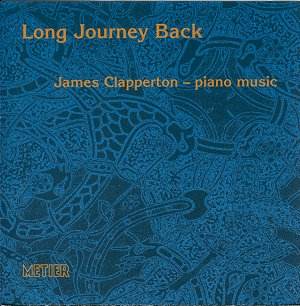Born in Aberdeen where he spent his childhood, composer/pianist
James Clapperton studied in Freiburg and at Buffalo University before
returning to the United Kingdom to complete an MMus at Exeter University
with Philip Grange and a DPhil in composition with Michael Finnissy
at Sussex University.
As a pianist he spent a good deal of time immersed
in the "mesmerising complexity" of composers such as Brian
Ferneyhough, Xenakis and Finnissy, all of whom he still admires, although
his own music underwent a dramatic change around 1988 when he moved
towards a new language of simplicity, perhaps closest at times to Howard
Skempton (Clapperton describes Skempton as the "emperor of the
miniature"). Indeed, Skempton is acknowledged by name in Stephen’s
Piano Book, commissioned by pianist Stephen Osborne. In his brief
tribute to Skempton, Clapperton’s language is reduced to its bare minimum:
a sequence of straightforward chord progressions, unembellished by melody,
moving line or counterpoint. Elsewhere, the music ranges from melody
in its sparsest form to works (often the more substantial pieces in
length) which still hark back to the dissonance of earlier pieces, often
showing a predilection for glistening, chromatic passage work in the
highest register of the piano set against slower moving melodic and
chordal sequences in the left hand.
This latter conflict of harmony and material is possibly
at its most obvious and effective in The Ressoning betuir Aige an
Yowth, taking Robert Henryson’s poem in which two figures, one young,
one old, espouse the virtues of "aige an yowth". Written for
two pianos the composer tells us that he replaces antiphony with cacophony
in a deliberate attempt to avoid the usual device of passing motive.
Stylistically Mikhashoffschina, written in tribute to Yvar Mikhashoff,
Clapperton’s piano teacher at Buffalo University, inhabits the same
world whilst evaporating into a tender, melodic central elegy, clearly
a very personal response to a man who had a major influence on the composer.
The earliest work following Clapperton’s "conversion",
Haar of 1988, is a brief portrait of a mist shrouded Aberdeen,
the word quite literally meaning sea mist, whilst The Testament of
Cresseid, which followed over the course of the next two years,
again turns to the poetry of Robert Henryson for inspiration. It is
in this work that Clapperton succeeds in merging his differing sound
worlds to the most homogeneous effect, echoed in the poetry telling
of two figures and their unrequited love for each other.
Like Howard Skempton, Clapperton has the ability to
move his listener with the simplest of material and Long Journey
Back, from which the disc takes its title, is a notable example,
written as a tribute to the composer’s father following a stroke. By
the same token, St. Patrick’s Day, the final piece of the Finnissy
dedicated Michael’s Piano Book, is a beautiful elegy in response
to political events in Northern Ireland and in particular the release
of the Birmingham Six and Guildford Four.
A good number of these pieces have the unmistakable
influence of the composer’s Scottish roots embedded in them, both melodically
and in the rhythmic inflections that permeate the music. It is perhaps
no surprise therefore that the disc closes with arrangements of two
"North East Songs", both touchingly realised and somehow
entirely characteristic of the composer’s stylistic fingerprint.
It would be good to have the opportunity to hear more
of Clapperton’s work outside the piano repertory, his violin concerto,
The Preiching of the Swallow for instance, won the PRS award
in 1993. There are also commissions for the Endymion Ensemble and a
number of festivals. In the meantime however this interesting, at times
touching, collection of pieces definitively played by the composer,
serves as a fine introduction to Clapperton’s music. All credit to Metier
for coming up trumps once again with music that deserves to be better
known.
Christopher Thomas


